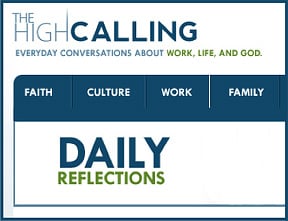Where is God’s Unfailing Love?
Lord, where is your unfailing love?
You promised it to David with a faithful pledge.
PRAYER: Dear Lord, thank you for Psalm 89. It models
for us exuberant praise. It encourages us to remember your goodness and
to offer extensive thanks for all you have done.
Yet this psalm also reminds us of our disappointment in you, our
questions, our aching cries for mercy. Even though we have been
wondrously blessed by you, our lives have not gone as we had expected.
Your faithful love to us seems somehow to have gotten lost in
translation. Thank you for giving us this psalm, which invites us to
pour out our hearts to you both in praise and in lament.
In this season of Advent, may we become more aware of our yearning
for you. May our hearts ache for more of your presence. Make yourself
and your goodness known to us afresh, O Lord.
Though our lives are far from perfect, and though we sometimes
wonder where you are and what you’re doing-or not doing-nevertheless, we
acknowledge you as God. Thus we pray as in the closing verse of Psalm
89: “Praise the LORD forever! Amen and amen!“
_________________________________________________
 Would you like to receive a Daily Reflection like this one in your email inbox each morning?
Would you like to receive a Daily Reflection like this one in your email inbox each morning?
Here’s how . . . .
This devotional comes from The High Calling: Everyday Conversations about Work, Life, and God (www.thehighcalling.org). You can read my Daily Reflections there, or sign up to have them sent to your email inbox each day. This website contains lots of encouragement for people who are trying to live out their faith in the workplace. The High Calling is associated with Laity Lodge, where I work.


Today is the fourth Sunday of Advent, a day to remember how much we
need the Lord and his love. Psalm 89 helps us get in touch with our
yearning for God.
If you were to read only the first 37 verses of Psalm 89, you’d
think it was an exuberant song of praise to God for anointing David as
Israel’s glorious and permanent king (through his descendants). Yet, if
you were to read only the next 14 verses, you’d consider Psalm 89 to be a
sad lament that seems to question God’s faithfulness. As verse 49
reads, “Lord, where is your unfailing love? You promised it to David
with a faithful pledge.” But now God’s anger with his “anointed king”
has led to divine rejection (89:38). “You have ended his splendor and
overturned his throne” (89:44). Though the writer of Psalm 89 surely
yearns for God to remember his unfailing love and deliver Israel from
devastation, he fills the closing verses of his psalm not with requests
for help but with laments and accusations. Then he adds the unexpected
final verse: “Praise the LORD forever! Amen and amen!” (89:52).
Psalm 89 helps us to enter more deeply into the spirit of Advent. It
reminds us of God’s promises to David, promises that seemed to be
forgotten when Israel became subject to foreign rulers. It underscores
the pain of God’s people as they experienced domination, suffering, and
disgrace. Psalm 89 expresses the sad history and yearning of the Jews
who still hoped that God would fulfill his promise to David by sending
an anointed king to deliver Israel and reestablish God’s kingdom.
Indeed, this king would call the Lord “Father” and would be known as
God’s “son” (89:26-27).
Though our life settings differ from that of the Jews who first used
Psalm 89 to express their longing for God’s salvation, many of us can
relate to the mix of celebration and lament in Psalm 89. We have been
blessed richly by God’s grace in our lives. Yet some of what we had
expected turned out poorly. Perhaps your “perfect job” became a
nightmare. Or your teenage children rejected their faith and chose to
live in a way that weighs heavily on your heart. Or your “secure”
retirement income evaporated in the economic crisis. Or a loved one was
diagnosed with serious cancer. Or . . . you name it. Like the writer of
Psalm 89, we often find ourselves thanking God for his goodness and, at
the same time, wondering where his goodness went. We yearn for God’s
grace to reappear, so that we might be delivered from our difficulties.
This yearning, whether in the hearts of Jews centuries ago, or in our
hearts today, captures the core of Advent.
QUESTIONS FOR FURTHER REFLECTION: In what ways have
you experienced God’s abundant blessings? How has God not done what you
expected? What are your deepest yearnings for God’s help?